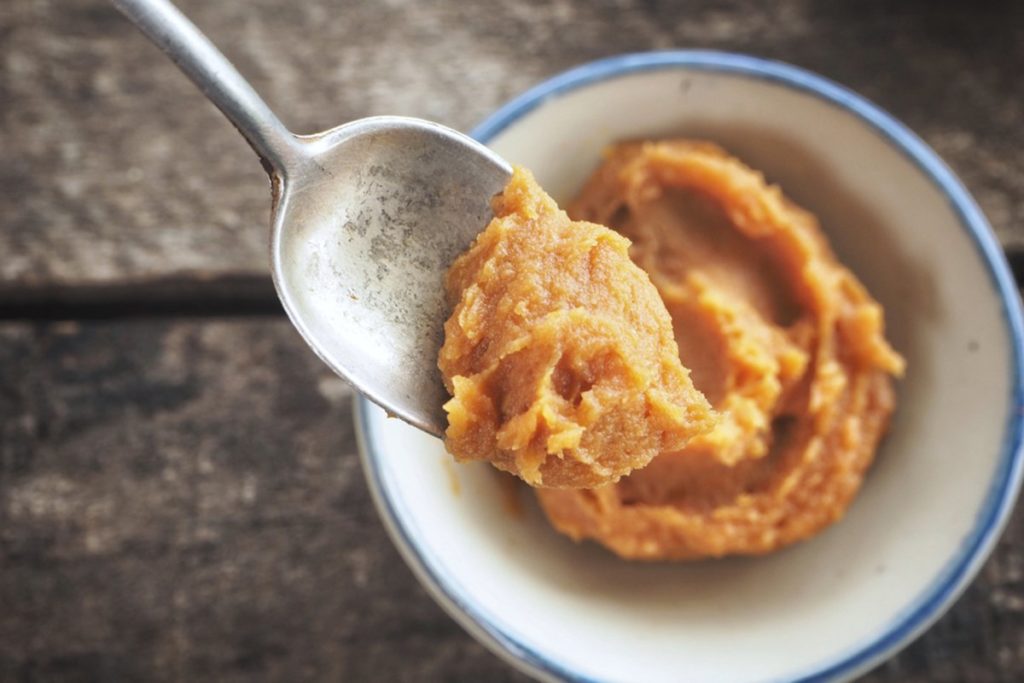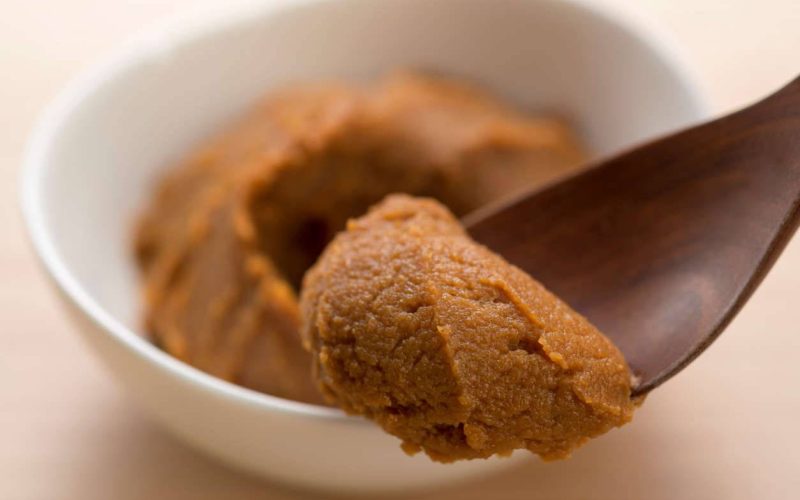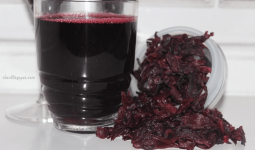Miso is a fermented food with many health benefits. We have covered a lot on fermented foods and probiotics.
Fermented foods like miso are good sources of probiotics, a powerful healing force in the world of microbiology.
The beneficial bacteria in miso and other fermented foods help the gut-brain axis and gut-skin axis function well. They improve overall health and keep sicknesses at bay.
What is Miso?
Miso is used to add a salty flavor to many Japanese meals. Miso has been a common food in Japan since the 8th century. Some sources even date it earlier than this.
It is the key ingredient in Japanese cooking and it forms the base of miso soups and staple dish. Its texture is similar to peanut butter. Miso is a cultured mixture of grain (e.g. barley or rice), koji (a mold Aspergillus oryzae), salt, and soybeans.
During the time of fermentation, the enzymes in the Koji work together with the microbe in the environment to break down the structure of the grains and soybeans into simple sugars, fatty acids, and amino acids.
This fermented food comes in many varieties, it can be chunky or smooth. The length of fermentation also varies, it can be fermented for weeks to several years.
There are more than a thousand types of miso and the differences are in the texture, color, and flavor. These changes are caused by the length of fermentation, the condition in which the miso was kept, and the ingredients used.
Miso labeled “awase” is a mixture of more than one kind of miso paste. The most common types of miso are the white or light miso or the dark or red one.
The white or light miso is called sweet miso. It can be light beige in color and some are yellow in color. This type is lighter and sweeter because of its short fermentation time.
It is also made with more grains like white rice and fewer soybeans. The red or dark miso is light brown in color and some are almost black. It is fermented for a long period of time and has a stronger, saltier, and funkier taste.
This type is made with a higher content of soybeans and salt. Light-colored miso are best for sweets and light dressings while dark miso is good for stews and long braises.
Nutritional and Health Benefits of Miso
Miso has all the benefits of fermented foods. From the time it originated in ancient Japan, it has been used and it is still used till date to treat certain health conditions.
This includes stomach ulcers, inflammation, high blood pressure, and fatigue. Recent research has found miso highly effective against cancer.
It reduces the growth rate of cancer cells. Miso also supports optimum digestive health and reduces the levels of cholesterol. What makes miso therapeutic is its high content of cholesterol.
Just by reading the nutritional label of miso, you will know why this ingredient is healthy and good for you. One serving of miso is low in calories and high in protein, vitamin K, manganese, and fiber.
An ounce of miso paste contains the following nutrients:
- 56 calories
- 4% DV of iron (0.7 milligrams)
- 4 grams of carbohydrates
- 4% DV phosphorous (44.5 milligrams)
- 3 grams of protein
- 4% DV riboflavin (0.1 milligrams)
- 7 grams of fat
- 5% DV of zinc (0.7 milligrams)
- 5 grams of dietary fiber
- 6% DV of copper (0.1 milligrams)
- 43% DV of sodium (1,044 milligrams)
- 10% DV of vitamin K (8.2 milligrams)
- 12% DV of manganese (0.2 milligrams)
Miso also contains a small amount of magnesium, vitamin B6, selenium, calcium, and potassium.
Health Benefits of Miso
A storehouse of probiotics
Fermented foods contain live and active cultures. Miso is a fermented food and a rich source of probiotics.
People who are sensitive to lactose or dairy products can get their probiotics from miso and other cultured foods.
The probiotics in miso boost the population of beneficial bacteria in your gut. This, in turn, will increase your immunity and boosts digestion.
Probiotics have many amazing health benefits like:
- Controlling appetite
- Regulate mood and improves mental health
- Reduces your risk of obesity
- Improves cognitive health
- Reduces your incidences of allergies
- Fortify your immune system
- Boosts digestion
Improves immunity
Your gut contains 80% of your immune system. Probiotics have a direct impact on your gut and this can help your immunity and overall health.
Probiotics ensure that your immune system is running well and strong.
Boosts digestion
Digestion is very important, our whole metabolism and body functions depend on healthy digestion of food.
The probiotics in miso prevent digestive problems induced by imbalances in the gut microflora. This includes diarrhea, irritable bowel syndrome, constipation bloating, and gas.
Probiotics even help relieve the symptoms of leaky gut syndrome, ulcerative colitis, and food allergies. These beneficial bacteria also cleanse your system and improve the ability of your body to heal from illnesses caused by gut issues.
Improves mental health
Miso contains B-vitamins, choline, and folate and these nutrients the function and development of the brain. Choline plays a very important role in the functions of your nervous system.
It boosts memory, mood, and muscle control.
Reduces blood pressure
Although miso is high in sodium (salt), it has shown to be effective in bringing down high blood pressure. A study showed that the sodium in miso is different from that in sodium chloride (NaCl).
The biological effect of the sodium in miso is caused by the length of fermentation period of the soybeans, rice or barley grains. In making miso, these grains and beans are fermented for more than 180 days.
Other studies also show that long-term consumption of miso soup halts increase in blood pressure in mice with organ damage or salt-induced hypertension.
The researchers believed that this is caused by a decreased absorption of sodium in the gut. They also believed that the direct effects of the nutrients in the soup made from soybeans had a direct effect in reducing blood pressure.
The decreased level of blood pressure despite the high intake of sodium is associated with a reduction in kidney and heart damage.
Improves blood health
Miso contains a good amount of vitamin K and this helps with blood clotting. This prevents bleeding and blood loss. It also boosts the circulation of blood.
Stops cancer cell growth
The immune-enhancing probiotics in miso plus the antioxidants and important nutrients present in this food helps it to be a top-cancer-preventing food.
Miso prevents the progression of cancerous tumors and prevents radiation injury. Miso that was fermented for more than 180 days prevents the growth of tumors and increased the ability of healthy cells to survive after radiation.
The probiotics in miso also block the growth of cancerous cells in the colon. It reduces the risks of stomach tumors, scavenges free radicals, and slows the development of breast tumors.
Many studies have suggested that prolonged fermentation is important in protecting people against cancer and radiation injury.
Natural source of electrolytes
Miso contains electrolytes like sodium. This can help replenish depleted stores of sodium in the body.
Storehouse of nutrients
If you are looking for a very nutritious food that contains a bit of important nutrients your body need, miso is one of such foods.
Miso helps in activating specific enzymes in beans and grains. This, in turn, will help you absorb the nutrients they provide like phosphorus, vitamin K, B vitamins, manganese, and copper.
Miso is also a rich source of protein, especially those made with soybeans. An ounce of miso has over 3 grams of proteins.
Decreases the levels of cholesterol
High cholesterol is a risk factor for heart disease and other chronic diseases. Plaques build up in the arteries thereby blocking the flow of blood when your cholesterol is high.
This can increase one’s risk of coming down with a stroke or heart disease. A study showed that consuming miso soup for three months reduced the levels of total cholesterol by 7.6%.
How to Consume Miso?

Since this is a fermented/cultured food, it is best to add it to long-cooked dishes at the end of the cooking. Don’t boil miso soups so that too much heat won’t kill the active bacteria in the miso.
This can reduce the health benefits. Miso generally can be eaten cooked or raw. It can also be mixed into soups, batters, dressings, and sauces.
Cooking with miso is easy and it is ready-to-use right out of the container. It does not need further preparation and it adds a unique saltiness to anything you add it to.
Note that miso is high in sodium and if you are on a low-sodium diet, you should be careful of how you consume it.
How To Buy And Store Miso
Miso is most times labeled “miso paste” or “soybean paste” in Asian grocery stores. It is sold in plastic tubs or jars. You can also find this in the refrigerator section of your local health food store.
Make sure you buy miso that has a short ingredient list. It should also be free of preservatives and stabilizers. Fermented products can last long.
Store your miso in the refrigerator in a tightly sealed container. You can use the original container it came in. It can be stored for a year or even longer.
Light miso has a shorter lifespan compared to dark miso because its fermentation time is short. Due to this, you should use your light miso in under one year.
Miso oxidizes. To prevent this, place a piece of plastic wrap directly against the past after each use. This will prevent it from changing color.
Powered miso or miso that is not stored in the refrigerator in a grocery store does not have the same content of beneficial bacterial as those stored in the refrigerator.
Risks and Side Effects of Miso
People who are allergic to soy should stay away from miso. You can try other fermented foods like kombucha. For those with gluten allergy, you can try little of miso as it is safe for most people with gluten sensitivity.
The process of fermentation changes the chemical structure of the grains and soybeans and they become easy to digest and less inflammatory.
People on blood-thinning medications should check with their doctor before taking miso because it contains high levels of vitamin K.
Conclusion
Including miso in your food regularly will improve your immunity, digestion, and overall health.
Miso can be purchased in any good health store.
Sources





